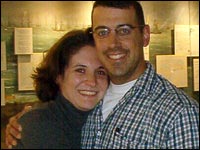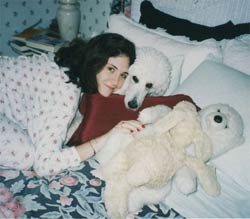
Holly wrote the following piece during her husband Rob’s deployment in 2003, as well as a series of provocative pieces on NPR. To go to her original Beliefnet article, “Lucky/Cursed,” click here. To check out her NPR clips, click here.
I have just this minute found out that my husband Rob, in Kuwait with his Army Reserve unit, has had his deployment extended. He thought he’d be home for Thanksgiving. Now we’re hoping for the first day of spring.
Chief among other feelings that I have at the moment is anger.
It’s a cold/hot feeling, one that I’ve become familiar with over the past seven months but wasn’t accustomed to before. I’d never before felt the tickle of a scream at the back of my throat as I watched the nightly news, never used to walk around carrying sometimes a pinprick of anger, sometimes a huge blazing ball.
The anger is the outward expression of an internal moral conflict that is continually going on in my mind, pulling me in two directions. One is that this is part of the greater good of serving your country. The other is that the Army is being so unfair it defies logic.
I am angry because of the politics of it all. The fact that Rob feels like he’s being used as a placeholder while our country figures out what to do next. The word is that low morale in the Reserves is going to lead to a mass exodus of Reservists as soon as their time is up.
There is also the sense of unfairness about our individual situation. Rob joined the Reserves as part of a ROTC scholarship, for which he owed eight years of service. That period was up last May. But in January, he received a call at work-his civilian job-saying he had been “involuntarily transferred” from his home unit to a different unit that needed a civil engineer. A unit that would be sent to the Middle East.
Rob was upset, but didn’t whine or complain. He is a commissioned officer in the U.S. Army, and he would do what his country asked of him. But he has emailed me many times that he shakes his head and gives a little bitter smile when he hears people crow about the “all-volunteer Army.” His orders actually have the word “involuntarily” on them!
And now those orders have been extended. When he does finally come home, we can only hope that there will be no “stop-loss” in effect, which would prohibit him from leaving the Army. We can only pray that he doesn’t get called up again in the interim.
But it seems like the Army always chooses the most painful route for families. They talk about it in terms of “the sacrifice families make.” But it feels more like a cruel curse.
At the same time, though, we are fortunate in many respects. Rob is an engineer, not an infantryman. His unit is tasked with combat support, they are not part of the “tip of the spear.” He’s in Kuwait, not Iraq.Part of his job requires him to use email, so we communicate every day. Recently, they installed a bank of land-line phones right next to his tent, so he’ll be able to call me without waiting for hours.
We are so lucky.
I should have the inner strength to handle the twin poles of lucky and cursed. After all, I am a Jew, and what group is more lucky/cursed? We are both God’s chosen people and the world’s targets. We are known as survivors, but only because we have had to survive evil after evil. The cultural memory and strength of my ancient tribe has always been a comfort to me, but it’s under special challenge in my life over the past months. As the psalmist asks, from whence comes my help?
For me, I’m sad to say, it’s turning out that anger, rather than calm faith, is the terrain between lucky and cursed. These two extremes are both insufficient to summarize my experience of being without my husband on a daily basis. And they don’t adequately describe his experience so far from home.
The two poles are, however, the immediate destinations for those who would comfort me, encourage Rob, and offer their support. It is a natural human response to try to compartmentalize an experience, to wrap it up in a labeled package as a way to feel better.
I don’t fault anyone for trying to express concern over a situation that is frustrating and confusing. In fact, I am so grateful to those who have reached out during this difficult time. To paraphrase the psalmist, from thence comes my help.
Inevitably, though, conversation quickly drifts to one end of the lucky/cursed spectrum or the other. And I am left in that angry, conflicted middle. When people give me the “lucky” lines-“It could be so much worse,” “Thank heavens he’s not in Iraq.” “At least he’s safe.”-I want to say that while I am painfully aware that things could be worse, no U.S. soldier in the Middle East is “safe.”
When I hear the “cursed” script-“They can’t do this to you!” “This isn’t fair,” “You should complain to the president.”-I feel the brief surge of patriotism, I want to say, “Well, somebody’s got to serve, and, yes, they can in fact do this to us.” It’s an almost desperate yearning to be able to trust that the government isn’t just playing with us like chess pieces.
I feel most lucky when hearing people talk about how cursed I am, and vice versa. It’s a confusing way to live, and it makes me question what level of confusion is reasonable to expect from life and what is beyond the pale. Maybe life really isn’t fair. You heard it here, folks!
I can’t really express any of these feelings without seeming either unwilling to be comforted or unsupportive of my husband’s service of our country. I’m neither of these things, but the cultural and political climate makes it difficult to know what to say-or feel.
I don’t want my crankiness to give the impression that I don’t support my husband or what he’s doing. So I have to go on, filling up the months until Rob comes home where he belongs. My anger will have to remain displaced, focused on the bank when they make an error, or the oven repairman when he is late for a service call. I feel bad that I’m so tightly wound, but they will just have to understand. After all, they are Americans too. And unfortunately in this age of terror, as Americans we all know what it’s like to be lucky/cursed.

